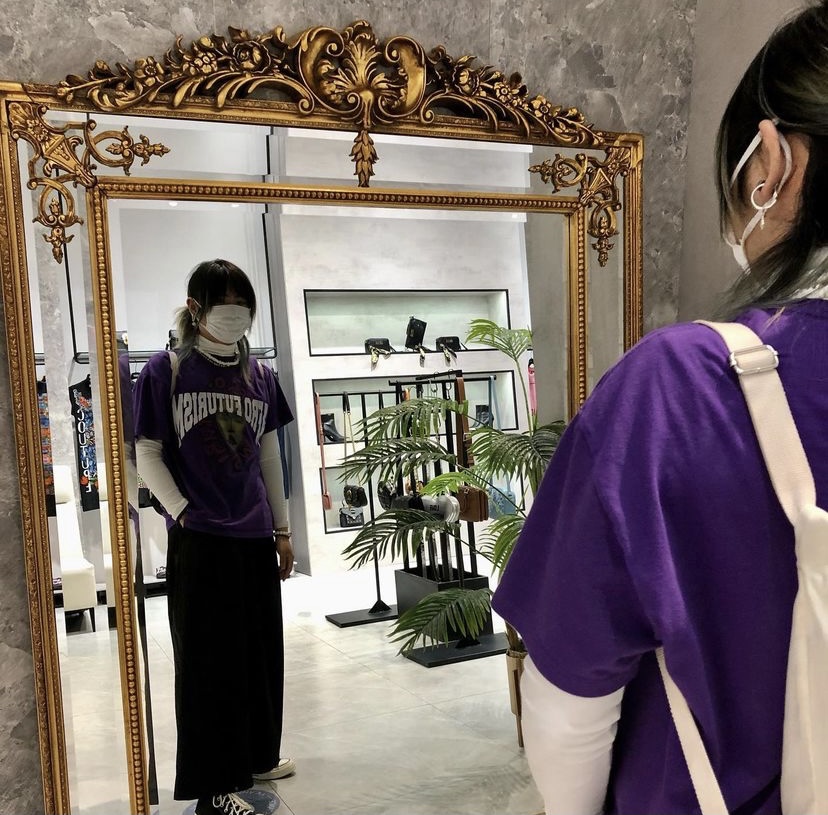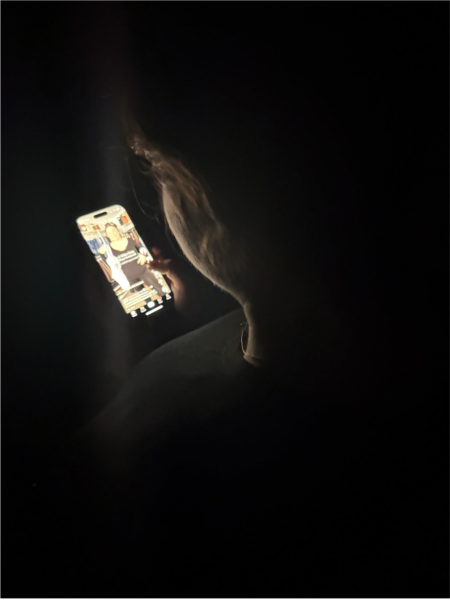The pandemic’s impact on style
Students share their newfound fashion influences from the pandemic
Courtesy of Temuulen Saikhanjavkahaa
Temuulen Saikhanjavkahaa sports a new outfit. Their style has changed drastically throughout the pandemic.
They are standing face-to-face, registering each opponent’s final move. This lengthy battle has now come to an end with a stand-off between “Emo,” “VCSO” and “Indie.” Which one will survive the aftermath of this treacherous global pandemic? Suddenly, just as the three approach their concluding stretch, a new member joins the battle of the trendsetter: Alt.
These are a few of the mainstream fashion trends — highlighted in mainstream media — that sparked during the pandemic. “Emo” and “Indie” both relate to music genres that came about in the ‘80s. Signified by dark expressionism through clothing and music, emotive impressionism (emo) is a highly-regarded fashion subgenre.
“VSCO” is related to the mobile app, known for its saturated filters and specific poses for photos. The first few months of the COVID-19 pandemic led to the downfall of the “VCSO” trend, replaced by Alternative and Indie styling. Also known as “Alt”, alternative expressionism consists of many previously adapted trends. Alternative wear and music denotes the modern tradition of style and strays away from bygone fashion.
The year and a half spent lingering at home over thinking caused many individuals to form, or contrive, a specific image for themselves. After coming from a background of heteronormalcy, senior Temuulen Saikhanjavkahaa formed an altered image of themself that strayed away from that norm, as well as personally growing a great deal in terms of style and expression.
“Now I’m more open I guess,” Saikhanjavkahaa said. “With how I express myself and who I am as a person.”
They noticed just how concealed their style was prior to the pandemic and feel that COVID-19 had an impact on this recognition. Amongst other things, this extended period of time gave Saikanjavkahaa the opportunity to reflect on how they want to be viewed by the world, though their battle with self-assertiveness sometimes lets that take their mind away from the ability of full stylish air. Throughout this recent year and a half, fashion has earnestly remained a staple in Saikhanjavkahaa’s life, allowing them to feel confident and fluid, ultimately defying their challenge with self-assertiveness.
“It made me realize who I was as a person,” Saikhanjavkahaa said.
As in-person school began, challenges like everyday weekly outfits were very difficult for those that depend on fashion for identity. Saikhanjavkahaa often faces that challenge before arriving at school each morning. Whether they would prefer sweats and a hoodie or a thoroughly planned out look is fully dependent on their outlook for the day. Prior to the pandemic, the repetitive clothing garments that stapled their previous wardrobe, would not have caused this issue to arise. While the pandemic has changed particular features of Saikhanjavkahaa’s style, it did not completely relieve them of all style-related dilemmas.
Spending her off time playing frisbee and attending Girls in Film club meetings, senior Emely Interiano described the lonesome effects of COVID-19 as a time for exploration and reconsideration. Because the pandemic abruptly stopped the 2020 school year, Interiano was allowed the time to challenge her norms and branch into a style she was comfortable with.
“During COVID-19, I got the chance to figure out who I am as a person and express myself,” Interiano said.
Believing style is something that displays personality, she confronted that statement by revealing the boredom she felt with her past self. Interiano’s lack of self and expression in her past wardrobe contaminated her true opinions and altered her into something she was not fond of. Although quarantine came to an end and students returned to, once again, fill school halls, Interiano had a changed sense of self.
Junior Annalisa Luoma, bass player and lead singer for her band, observed not only her style change over the pandemic, but a habitual change. Through the boredom of COVID-19 isolation she gained a larger sense of creativity.
“Over quarantine I got super bored, and [the boredom of COVID-19 isolation] really gave me an outlet for being able to express how I was feeling,” Luoma said.
The challenges of being alone for such a long time caused her to develop certain skills and interests, in relation to her way of expression. Sewing and clothing revamps cured her boredom for the most part, these skills being inspired by thrifting and viewing mainstream media trends on platforms like Tiktok. Though partly cured by this newly adapted source of entertainment, Luoma remained aware of how quarantine negatively impacted her life.
“I feel like quarantine almost felt like it wasn’t a real aspect of your life,” Luoma said. Throughout the opening weeks of the new school year, she noticed how her classmates’ style changed. Many of her peers resembled their online profiles while many looked completely different.
“Once they got back to regular school, they kind of adapted back into what they were before,” Luoma said.
Alike to her peers, Luoma also faced identity based changes of her own. Though describing her alterations as more “natural,” she called attention to one of her own major changes from quarantine: her hair color. As a freshman, she could be seen in the halls with brightly dyed green hair, though now it is colored both black and red. Luoma considers this change to be slightly impacted by the pandemic and generally caused by her changing identity. This change represents her growth in self-expression during the pandemic.
The COVID-19 pandemic has certainly had its impacts on the students of Washington-Liberty. Through trends, boredom and sparks of creativity, this past year and a half has affected the identities of many through its everlasting abnormalities. Quarantine remains far from normal, Luoma believes, and will remain to be one of the greatest causes of change.
“Nothing is normal over quarantine…everybody is changing something,” Luoma said.














Delonta • Nov 12, 2021 at 1:14 PM
Good article, a future journalist write thiss!!
jazmin • Nov 11, 2021 at 10:37 PM
this is absolutely amazing! i’m impressed really.
Anonymous • Nov 8, 2021 at 9:44 AM
So insightful. Great read!